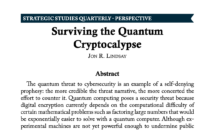The quantum threat to cybersecurity is an example of a self-denying prophesy: the more credible the threat narrative, the more concerted the effort to counter it. Quantum computing poses a security threat because digital encryption currently depends on the computational difficulty of certain mathematical problems such as factoring large numbers that would be exponentially easier to solve with a quantum computer. Although experimental machines are not yet powerful enough to undermine public encryption, they do demonstrate that quantum computers are able, under some circumstances, to outperform the fastest classical supercomputers. Indeed, the quantum threat is so credible that the scientific community has been working on cryptographic countermeasures that will soon be certified for public use. Research is also well underway on new quantum networks that can enhance cryptographic security. The size of the quantum window of vulnerability depends on relative rates of engineering progress in quantum computing and quantum-safe alternatives, as well as political considerations about how long secrets need to be protected. There are reasons to be cautiously optimistic that countermeasures are maturing faster than the threat. Nevertheless, the quantum threat should be taken seriously, which is precisely why it might never materialize.
Articles, Papers, and Reports Back to Research Articles Archive
June 25, 2020
Surviving the Quantum Cryptocalypse
